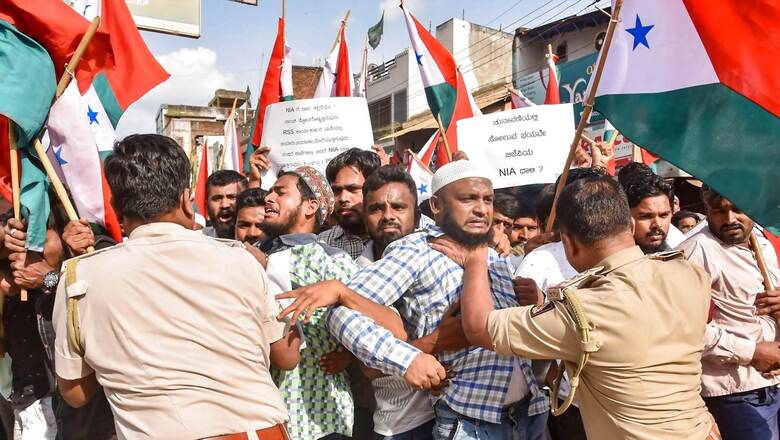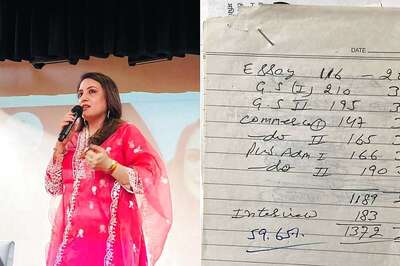
views
Fuelled by radicalised sermons of preachers, considered the most important part of Muslim society, social jihad is trying to gain ground in India. It comes in the form of radical indoctrination that first approaches the young section of the targeted population, and then their dependents.
Blasphemy is the core of social jihad in Muslim countries like Pakistan and Bangladesh, but in India, where Hindus are in majority (79.8% of the population) and Muslims are in minority (14.2%), the radical preachers and Muslim fundamentalists adopt a different ploy.
Their first strategy is to show Muslims as victims. They show how Muslims who once ruled India for centuries should again take a central role by making India a Muslim nation. The second strategy that they adopt is blasphemy and incidents like the Babri mosque demolition in 1992 or the recent cases of offensive remarks against Prophet Muhammad become their selling points.
Social jihadists challenge the targeted masses on their faith. Showing the other community in a bad light is the first step of their mass radicalisation programme. Once their recruits are in, they proceed to the next level. They organise protests. They become more vocal on political matters. They start intermixing orthodox religious practices more and more into the society and force and radicalise people to follow them. They create their own agenda with a visual show of strength.
Begin from a place with its people and proceed to co-opt other places and people – that is their core line to operate.
Tracing the roots
The Popular Front of India (PFI) was formed by radical and extremist organisations in 2006 in Kerala. An offshoot of the Student Islamic Movement of India (SIMI), a banned extremist organisation, social jihad was its main weapon. Thinking jihad from an extremist perspective, similar to what terror organisations do, it has tried to radicalise parts of the Muslim society in the country but has met with sporadic success only. Clearly, Muslims of India are not like many Muslims of Pakistan and Bangladesh and they don’t welcome outfits like PFI and SIMI.
SIMI was formed in 1977 and banned in 2001. But the 24 years of active existence meant the organisation had spread its wings of radicalisation throughout the country. Between SIMI’s formation and ban, many splinter organisations were formed as well to further push the extremist agenda and expand the scale of radicalisation. Some of them came together to form the PFI in 2006. These radical organisations made the 1992 Babri Masjid demolition incident the core of their social jihad agenda, saying it would never be forgotten. PFI called the 2019 Supreme Court Ayodhya verdict unfair and used it as a tool to incite people.
To make an umbrella and further expand its outreach, the PFI saw two different spinoffs in 2009. SDPI in Kerala was started as its political wing while Campus Front of India (CFI) began as its youth wing in Delhi. Though CFI says it is an independent organisation, it is seen as an extension of PFI.
In the last 15 years, PFI and its splinter organisations have not spread across India only but have an international presence as well. The outfit that was banned on Wednesday had footrpints in 22 states. The Kerala-based organisation now even has headquarters in Delhi and its trail can be found even in northeast India. Internationally, PFI used to get funding from Saudi Arabia, the UAE, Oman, Qatar, and other countries. Some Kerala PFI activists joined ISIS. The outfit is also linked with Bangladesh Jamaat-ul-Mujahideen Bangladesh (JMB), say officials.
‘Coward Hindus’
“PFI is a SIMI resurrection,” said a Kerala government affidavit in 2012. According to the affidavit, PFI was working on sinister designs. “PFI was following a clandestine agenda of Islamisation of society. The outfit promoted conversion and pushed for communalisation of issues with a view to the benefit of Islam. Its extremist agenda included recruitment and maintenance of indoctrinated Muslim youth for undertaking actions including selective elimination of persons, who in their perception are enemies of Islam,” said the affidavit.
Though PFI said its stated goal was the upliftment of the Muslim community, soon after its formation, the organisation got involved in radical and violent activities, as confirmed by another Kerala government affidavit in the state high court. The affidavit said PFI, an extremist organisation, was involved in at least 106 communal cases, 27 communally motivated murders, and 86 attempt-to-murder cases.
In 2015, 13 PFI members were sent to jail for chopping off a Kerala professor’s hand in July 2010. They accused him of blasphemy. The 2018 Hadiya Jehan case in Kerala made headlines. PFI was involved in this Hindu-to-Muslim conversion case as alleged by Hadiya alias Akhila’s father. PFI is also alleged to be involved in the February 2020 anti-CAA protests and riots in northeast Delhi.
The outfit’s spread can be gauged from the arrest of the big PFI module from Bihar this year. The arrest revealed the group’s plan to convert India into an Islamic country by 2047, the day India completes 100 years of independence and the year by which it hopes to come into the category of developed nations. PFI was distributing a “secret document”, urging Muslims to come together to establish Islamic rule again in India, which was taken away by the British Raj by winning over “cowardly” Hindus.
PFI, with its student wing CFI, is also allegedly involved in the ongoing hijab row in Karnataka. Earlier this month, the Karnataka government told the Supreme Court that the student petitioners challenging the Karnataka hijab ban were influenced by PFI. The petitioners used to wear normal school uniforms without hijab earlier, the court was told. “This is not a spontaneous act of a few individual children that want to wear hijab. They were part of a planned conspiracy. These children are acting as advised by PFI,” the state government claimed.
‘Sar Tan Se Juda’
The controversial Prophet remark by suspended BJP spokesperson Nupur Sharma and the row and crisis it generated was another issue pushed by social jihadists. “Sar Tan Se Juda”, the slogan originated in Pakistan to kill blasphemers insulting the Prophet, became a war cry in India for many radicalised youth.
Some preachers repeated the slogan again and again and its reflection was seen in a Hyderabad protest rally where even children chanted it. The National Commission for Protection of Child Rights (NCPCR) asked Hyderabad police to take action after its social media footage went viral. Hyderabad saw protests over BJP MLA T Raja Singh’s alleged derogatory remarks on Prophet Muhammad.
Some were killed for supporting Nupur Sharma by common people who were radicalised by such slogans and preachers’ provocative statements. Rajasthan tailor Kanhaiya Lal was brutally murdered in broad daylight in his shop on June 28. The accused even posted a video of beheading and threatened Prime Minister Narendra Modi as well. Udaipur had seen a “Sar Tan Se Juda” rally by radicals just a week before, and a week later some locals took the unprecedented step. The National Investigation Agency said the video was circulated in order to trigger panic and strike terror among the masses across the country. Also, the main accused in the murder case of Amravati chemist Umesh Kolhe was his friend of 16 years.
These two are not isolated cases and many people have received similar threats. PFI’s Bihar module was also involved in conspiracies to target Nupur Sharma. Moreover, the current radical push in India has a Pakistan connection as well. The alleged murderers in the Udaipur case were in touch with Pakistan’s radical organisation Dawat-e-Islami. The investigation further found out that around 18 to 19 operatives of the organisation were in regular touch with 300 Indians to destabilise society by carrying out more such beheading incidents.
Delayed action?
It took the government many years to ban SIMI. Before that, the extremist and terror outfit was active for 24 years. In the case of PFI, disturbing reports were available as early as 2012.
Many of the founding members of PFI were SIMI members as well, like P Koya, EM Abdul Rahiman, and E Abubacker. If SIMI is still banned, PFI should have faced similar treatment much earlier, to stop its spread and to stop the spread of radicalisation and extremism in India.
Read all the Latest News India and Breaking News here

















Comments
0 comment